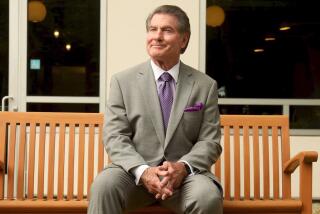Rabbis Share More Than Their Calling
- Share via
BEVERLY HILLS — The Rabbis Weiss, elder and younger, are the spiritual leaders of one of the largest Orthodox congregations in the western United States and one of the largest Jewish communities on the occupied West Bank of the Jordan, respectively.
Their situations may be unusual, but they are hardly unlikely. Although he trained as an electrical engineer, Avi Weiss, 32, has been on the rabbinical track--and dreaming of emigration to Israel--for most of his life.
Born in South Africa and educated in seminaries in New York and in Israel, Weiss and his wife, Tammy, an educational psychologist, emigrated to Israel 10 years ago.
They and their five children moved in July to Ariel, a town of about 13,000 on a hilltop between the Mediterranean Sea and the Jordan River. There, Weiss will serve as chief rabbi for the city’s nine Ashkenazi (European-rite) congregations.
Ariel was founded in 1978. Although it is within sight of the Tel Aviv skyline, it will be surrounded by a Palestinian entity if the Arab population of Samaria wins self-rule or becomes part of a new state in the wake of Israel’s recent accord with the Palestine Liberation Organization.
The prospect makes his parents “a little nervous at what might happen,” said his father, Abner Weiss, 55, who has headed Congregation Beth Jacob in Beverly Hills for nearly a decade.
Although he always expected to follow in his father’s footsteps, Avi Weiss said, “My father wanted me to do something other than the rabbinate,” so he studied electrical engineering at City University of New York.
“I guess he believed being a rabbi was not a good job for a good Jewish boy,” he joked.
*
More seriously, he said, the pulpit is a difficult calling, and his father wanted him to have something to fall back on.
“We feel very proud of him,” Abner Weiss said, not just because he made a life in Israel, but also for his decision to move into a largely secular town where the synagogues are full on religious holidays but less populated during the rest of the year.
Avi Weiss said he hopes to bring in more observant residents by building a religious high school and establishing a yeshivat hesder, under which young men combine religious studies with army service.
He went to one himself, serving in the Civil Defense force rather than the army because of poor eyesight.
Later, he helped scholar Adin Steinsaltz produce the highly acclaimed first volume of an English translation of the Talmud, the compendium of Jewish law. Then he became the first rabbi of a 45-year-old religious kibbutz near the Gaza Strip.
On a recent trip to the United States he was trying to rally the public to put pressure on the Israeli government to honor its commitments to the Jewish population of the territories in the wake of the recent agreement with the PLO.
The idea, he said, is “not to fight the government, but to hold them to their promises very, very closely,” including a guarantee that no settlers will be ousted and that the Israeli police and army will protect them.
Some militant settlers of Judea and Samaria have denounced the treaty with the PLO as a traitorous sellout. But Avi Weiss said that most of the residents of Ariel are resigned to it now that it has been endorsed by a slim majority of the Knesset, the Israeli parliament.
Still, he said, with the prospect of Palestinian rule in Jericho and the Gaza Strip, and continuing violence against the Israeli population of the territories, he said, “We do feel we have been deserted to an extent.”
After all, Ariel was founded as a strategic outpost by a previous Labor government, he noted. And Prime Minister Yitzhak Rabin’s recent comparison of settlers who blocked highways and firebombed Arab cars to the Islamic Hamas movement did not win him any points either.
“The hostility of the current government toward people who went up at government instruction leaves people baffled and angry,” he said. “Unfortunately, Rabin has broken every promise he has made since the election.”
Instead of a Palestinian entity, he said, he would like to see continued Israeli sovereignty, but with Arabs free to run their own affairs on the local level and voting for the Jordanian parliament in Amman.
*
This is hardly the likely outcome of the recent agreement between Rabin and PLO leader Yasser Arafat, but Weiss said he expects the euphoria surrounding the handshake on the White House lawn to vanish soon enough.
“The Israeli people will not allow themselves to make the dangerous gesture of creating a Palestinian state on our own doorstep,” he said.
Despite the uncertainty raised by the accord, about 400 families have moved to Ariel since last summer, he said.
They are drawn by cheap apartments--$75,000 for a two-bedroom unit that would be palatial by Tel Aviv standards--and jobs in the town’s 90 factories, although many residents commute to work in Israeli cities.
More to Read
Sign up for Essential California
The most important California stories and recommendations in your inbox every morning.
You may occasionally receive promotional content from the Los Angeles Times.












